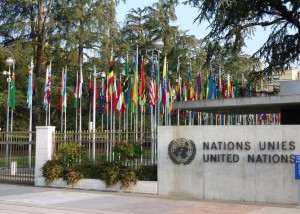Guest Blogger: Dr. Himangi Bhardwaj, Senior Health Adviser for the FCO’s (Foreign and Commonwealth Office) network in India, and part of the official UK delegation to the World Health Assembly, reports on her maiden United Nations experience, and her exciting adventures!

Geneva: The world in a city
As a first-timer to Geneva, it is difficult not to be over-awed by the surroundings and by the thought of seeing the hours you have spent in drafting and advocacy efforts actually take the shape of a resolution the world might agree to!
WHA 68: India’s presidency and the German commitment
The opening of the 68th assembly was all ceremonial splendour with Indian Union Minister for Health & Family Welfare, Sri Jagat Prakash Nadda assuming presidency of the assembly for 2015-16. He stressed on the critical importance of building and maintaining strong, resilient health systems, given the background of the Ebola outbreak and the earthquake in Nepal.
Angela Merkel, German Chancellor and special guest at the opening of the assembly, made a very strong statement in support of global cooperation for better health. Germany’s commitment to global health is clear from the focus it has brought to health by putting Ebola, poverty-related neglected tropical diseases, and resistance to antibiotics on the G7 agenda during its presidency.
A challenging agenda, Alpine air and day-night negotiations
Thus the assembly began its deliberations and negotiations through committee A (technical and health matters) and committee B (financial and management issues), debating and approving the texts of resolutions which were then submitted to the plenary meeting where all the delegates to the World Health Assembly, listened to reports, and adopted the resolutions transmitted by the committees. It was fascinating to see the process of arriving at words which would affect the health of the entire world… and which were spoken in so many different, intriguing languages. Hats off to the translators for making sure we knew what we were talking about!
The Alpine air must have a role to play in the stamina and enthusiasm shown by delegates from all 194 member states in negotiating key resolutions, not only during the day but also sometimes, through the night!
The fight against AMR: a GREAT example
A landmark moment in global health was the culmination of UK’s two year campaign against antimicrobial resistance (AMR) in the adoption of the first ever Global Action Plan to tackle AMR by the WHA 68. This was one of our top priorities for the WHA and the first major deliverable of our cross-government AMR international strategy. The Prime Minister’s support, Chief Medical Officer’s conviction, and the strength of the One HMG network were crucial to the success of this campaign. The strong leadership and commitment – financial, technical, and political, shown by UK to support the global fight against AMR also helped us in gaining tremendous respect from developing and developed countries alike. We continue to work closely with the cross government network, and the Indian government, for effective implementation of the Global Action Plan.
The UN experience and the UK advantage
As I work on cementing the relationships made during the assembly, particularly with the Indian Health Minister and his office, I will always remember WHA 68 as my first real life lesson in multilateral diplomacy and policy-making, and for my first opportunity to represent UK to delegations from the entire world (and become a minor facebook celebrity in the process!).
